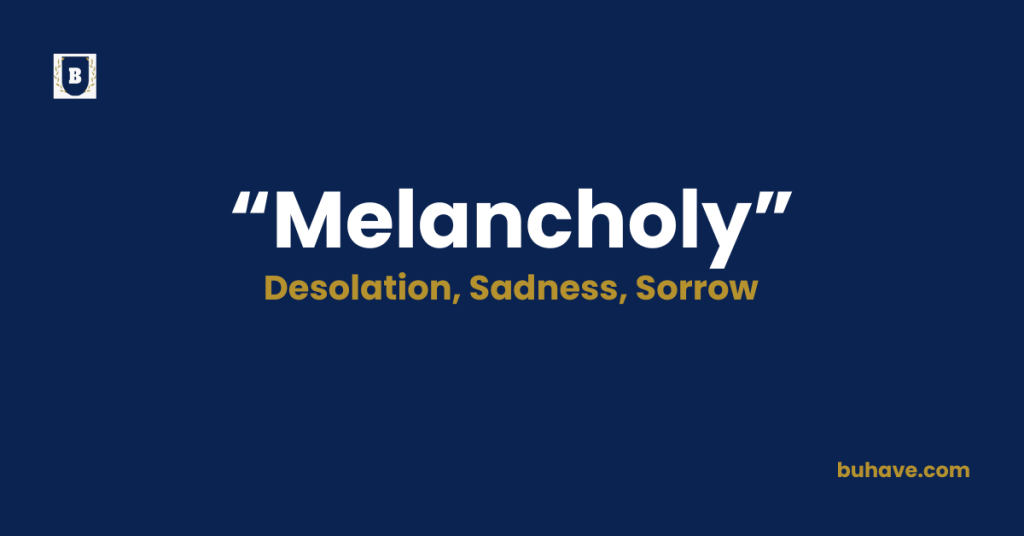The word ‘Melancholy’ (Noun) refers to a feeling of deep sadness or a pensive, reflective state of mind. It describes a mood that is often quiet, somber, and somewhat poetic in nature In this guide, you’ll learn the full definition, synonyms, antonyms, etymology, and real-life examples of how to use ‘Melancholy’ correctly in sentences.
Melancholy Explained in Depth
A complete and detailed guide to the word Melancholy including meaning, definition, examples, etymology, synonyms, and antonyms.
Meanings of Melancholy
Melancholy means a deep, lingering sadness or a reflective, somber mood. It’s a feeling of thoughtful sadness that often comes without a specific reason or can be linked to loss, nostalgia, or reflection on life’s challenges. It’s a complex emotion that can also carry a touch of beauty
or introspection.
For example, looking through old photographs might bring a sense of melancholy as you remember times that have passed. Or, you might feel melancholy on a rainy afternoon, feeling both sad and reflective.
Definition
Melancholy refer a feeling of deep sadness or a pensive, reflective state of mind. It describes a mood that is often quiet, somber, and somewhat poetic in nature. It can refer to a general sadness without an obvious cause, or to a mood that blends sadness with reflection or nostalgia.
For instance, a writer might describe a character sitting alone in a room with a sense of melancholy. Or you might feel melancholy when thinking about the past or lost opportunities.
Etymology
The word “melancholy” comes from the Middle English melancolie, borrowed from the Old French of the same spelling, which was derived from
Late Latin melancholia—meaning “sadness.” The ultimate root is the Greek word melankholia:
- melas meaning “black”
- khole meaning “bile”
Ancient medical theory believed that an excess of “black bile” in the body caused a melancholic temperament—hence the association with sadness
and introspection.
Example Sentences
- Sitting by the window on a rainy day often leaves me feeling a bit melancholy.
- The old song filled her with a sweet sense of melancholy for days gone by.
- Despite the celebration, he couldn’t shake the melancholy that had settled in his heart.
Melancholy Synonyms
- Sadness
- Sorrow
- Gloom
- Despondency
- Dejection
- Despair
- Mournfulness
- Blue
- Wistfulness
- Pensiveness
Melancholy Antonyms
- Joy
- Happiness
- Cheerfulness
- Gladness
- Contentment
- Delight
- Ecstasy
- Excitement
- Optimism
- Hopefulness
FAQs about Melancholy
Here are some frequently asked questions (FAQs) about the word “Melancholy”
- What does “melancholy” actually mean?
“Melancholy” refers to a feeling of deep, reflective sadness. It often carries a tone of introspection or nostalgia, rather than acute distress. - Is melancholy always negative?
Not necessarily. While it does describe sadness, it can also have a poetic or thoughtful quality that makes it a complex, even beautiful,
emotion. - Can “melancholy” be used in a positive way?
Yes. It can describe a bittersweet feeling that is sad but also peaceful or reflective. For example, “The melancholy music was hauntingly
beautiful.” - How is “melancholy” different from “sad”?
“Sad” is more general and immediate, while “melancholy” suggests a deeper, often lingering, reflective sadness that might not have an obvious
cause. - Can I use “melancholy” in casual conversation?
Yes, but it has a more literary tone. In everyday speech, people might use “sad” or “down” instead. But “melancholy” is perfect for writing,
literature, or expressing more nuanced emotions.

















